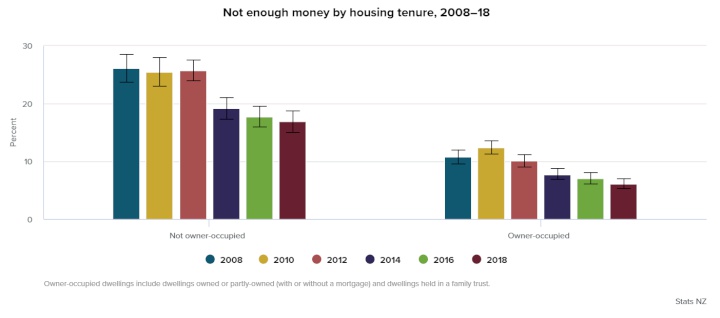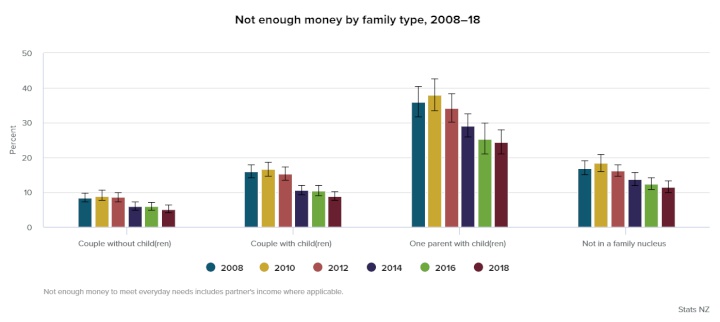New Zealanders feel financially better off
According to results from the General Social Survey, the proportion of people who felt they had enough or more than enough money to meet everyday needs increased from 51 percent in 2008 to 63 percent in 2018, Stats NZ said today.
“People who felt they had enough or more than enough money to meet everyday needs also felt more satisfied with life overall than those who felt they didn’t have enough money,” wellbeing and housing statistics manager Dr Claire Bretherton said.
In 2008, about 1 in 6 people (15 percent) felt they didn’t have enough money to meet everyday needs. In 2018, that had fallen to about 1 in 10 people (9.8 percent).
“In 2008 and 2009, at around the time of the global financial crisis, unemployment in New Zealand was rising sharply and this may have had an impact on how New Zealanders felt about their own financial wellbeing,” Dr Bretherton said.
“The unemployment rate reached a peak in September 2012 and has been trending downwards ever since.”
The improvement in financial wellbeing was felt across a wide range of groups, including: homeowners, renters, single parents, and European, Māori, and Asian ethnic groups.

Renters feel improved financial wellbeing but still behind homeowners
In 2018, 48 percent of renters felt they had enough or more than enough money to meet everyday needs, up from 37 percent in 2008. This coincides with a decrease in the proportion of renters saying they didn’t have enough money, from around one-quarter (26 percent) in 2008 to around 1 in 6 (17 percent) in 2018.

Despite these improvements, renters remained over twice as likely as homeowners to say they didn’t have enough money to meet everyday needs.
“Other Stats NZ data shows renters face higher housing costs as a proportion of their household income than homeowners. This may be why a greater share of renters felt worse off financially,” Dr Bretherton said.
Single parents feel better off
Single parents are among those who report the greatest financial struggles, but their reported financial wellbeing has improved in the past decade.
The proportion of single parents who felt they didn’t have enough money to meet everyday needs decreased from over one-third (36 percent) in 2008 to around one-quarter (24 percent) in 2018 – the biggest decrease of any family type.

Rise in ‘only just enough money’ felt by higher income households in recent periods
In 2018, around one-quarter (26 percent) of people with a household income between $100,001 and $150,000 and 1 in 6 (17 percent) of those with a household income over $150,000 reported they had only just enough money to meet everyday needs. This was up from about 1 in 5 (21 percent) and 1 in 9 (12 percent), respectively, in 2014.
There was little change for either income group between 2008 and 2012.
Note: 2014 to 2018 data has been restricted to those aged 18 or older for comparison with earlier data.
For more information about these statistics:
• Visit Wellbeing statistics: 2018


 PSA: PPPs Pose Risks To New Zealand Workers
PSA: PPPs Pose Risks To New Zealand Workers Office of the Privacy Commissioner: New Research Shows Business Leaders Fear Being On The Hook For Others’ Privacy Breaches
Office of the Privacy Commissioner: New Research Shows Business Leaders Fear Being On The Hook For Others’ Privacy Breaches E Tū: E Tū Members Send Open Letter To James Grenon And NZME Board
E Tū: E Tū Members Send Open Letter To James Grenon And NZME Board Commerce Commission: Commission Calls For Comments On Copper Access Deregulation
Commerce Commission: Commission Calls For Comments On Copper Access Deregulation New Zealand Association of Scientists: NZAS Supports Saving Biotechnology Capacity In Callaghan; Asks What Now For Applied Technology Group
New Zealand Association of Scientists: NZAS Supports Saving Biotechnology Capacity In Callaghan; Asks What Now For Applied Technology Group Stats NZ: Business Employment Data - December 2024 Quarter
Stats NZ: Business Employment Data - December 2024 Quarter



